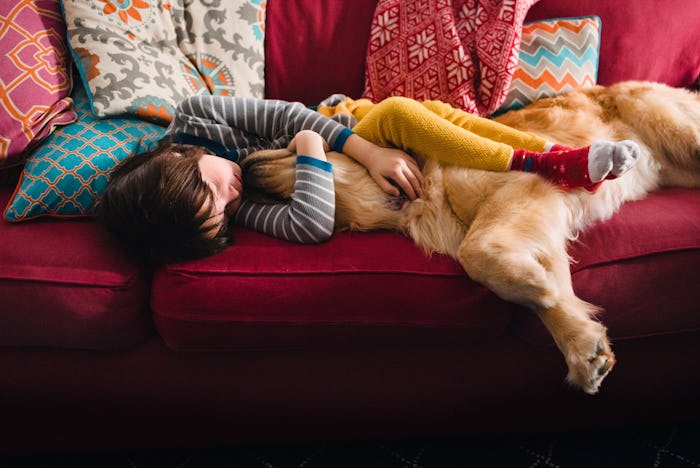Life

Here's How To Prepare Your Pet For When You Go Back To Work After Quarantine
Quarantine has been mentally draining for us people, but it’s safe to say that our four-legged friends have been loving all the extra time with their humans. In fact, pets have been having such a great time bonding (non-stop) with their owners that they may have trouble when it comes time to separate. As pet owners start thinking about going back to work and school outside of the home, it's time to prepare pets for separation after quarantine.
“As pets get accustomed to this new schedule and experience more consistent interactions with their human companions, our pets may have difficulty as pet parents start to transition back to a typical office setting. This may be more noticeable in single pet households compared to multi-pet households,” Dr. Emily Wilson, doctor of veterinary medicine, tells Romper.
If you've noticed that your pet seems a little clingy these days, you're not alone. I, like most people, have been home a lot recently. While I feel like I'm living in a deranged remake of Groundhogs Day, my dog is living her best life. In the rare instance when I do leave now (even if it's just for five minutes to take out the trash), I can see my dog staring out the window, and she reacts with such enthusiasm when I return that you'd think I'd been gone for weeks. In short, she's in for a surprise when my partner and I do resume our regularly scheduled programming of office jobs, errands, and social activities (whenever that day comes).
"Dogs are becoming 'overly bonded,' which means they’re intensely reliant on our presence to stay calm," a Bloomberg explained. This means the pooches are losing their ability to self-soothe, and, in turn, are experiencing undue stress when their owner leaves the house (or in some cases, even the room). If a dog is exasperated just because their owner went from the kitchen to the bedroom without checking with them first, well, you can only imagine the panic that will ensue when their owners leave for an extended period of time.
“The causes of separation anxiety are complex, but a change in routine is more likely to trigger it,” Wilson tells Romper. “A dog with separation anxiety may excessively vocalize when alone, exhibit destructive behavior, or inappropriately urinate or defecate inside the home. Please seek veterinary care if you're noticing any of these symptoms in your pet.”
Many people adopted animals during quarantine, which, according to The New York Times, was likely due to a combination of people being lonely in isolation while also having extra time to care for a pet. Pets who have never had the experience of being alone (like new puppies) will need to adjust. However, “separation anxiety does appear to be at least partially based in genetics, so any pet may be affected. Dogs are also pack animals so being alone doesn’t come naturally to them,” Dr. Jennifer Coates, a doctor of veterinary medicine, says. This is particularly true if they're unprepared for being on their own.
“Pets handle gradual changes to their schedule better than sudden transitions,” Coates tells Romper. She adds that it could take at least a couple of weeks to move your pet to a routine that more closely matches their new normal. For example, you can start by leaving your dog at home alone for increasingly long periods of time. "Your dog will probably be a little nervous when you are preparing to leave and very excited when you return, but keep your interactions with your dog low-key during these times. If you don’t make a big deal over leaving or coming home, your dog will soon react more calmly, too,” Coates adds.
She adds that food-dispensing toys can fight boredom and make your pet’s time home alone more tolerable. And remember that pets who are suffering from separation anxiety are not purposefully being bad or punishing you for leaving; they're truly afraid. "Punishing a scared pet only makes matters worse. Talk to your veterinarian about treatment options if your pet’s separation anxiety is adversely affecting their (or your) quality of life," Coates says.
The good news, Wilson tells Romper, is that pets are highly adaptable and can quickly adjust to new situations. "Many will do just fine with their owners returning back to work or leaving the house for extended periods of time," she says. And some pets may actually be glad to see their humans leave (looking at you, cats). People are, "loud, we take up space, and may have disrupted the usual quiet, downtime that many pets enjoy," Wilson says.
Experts:
Dr. Jennifer Coates, doctor of veterinary medicine, The Spruce Veterinary Review Board
Dr. Emily Wilson, doctor of veterinary medicine, with Fuzzy Pet Health
This article was originally published on